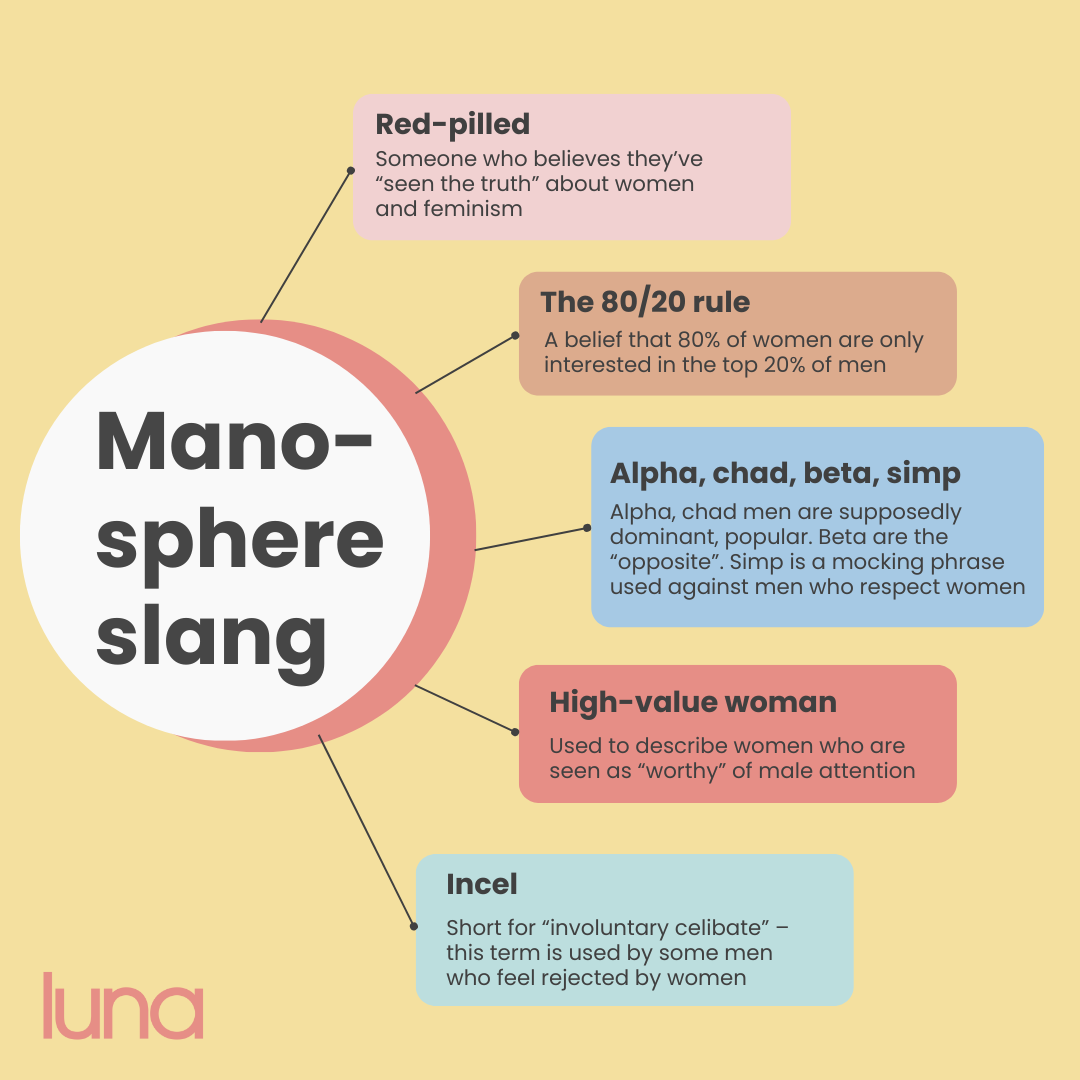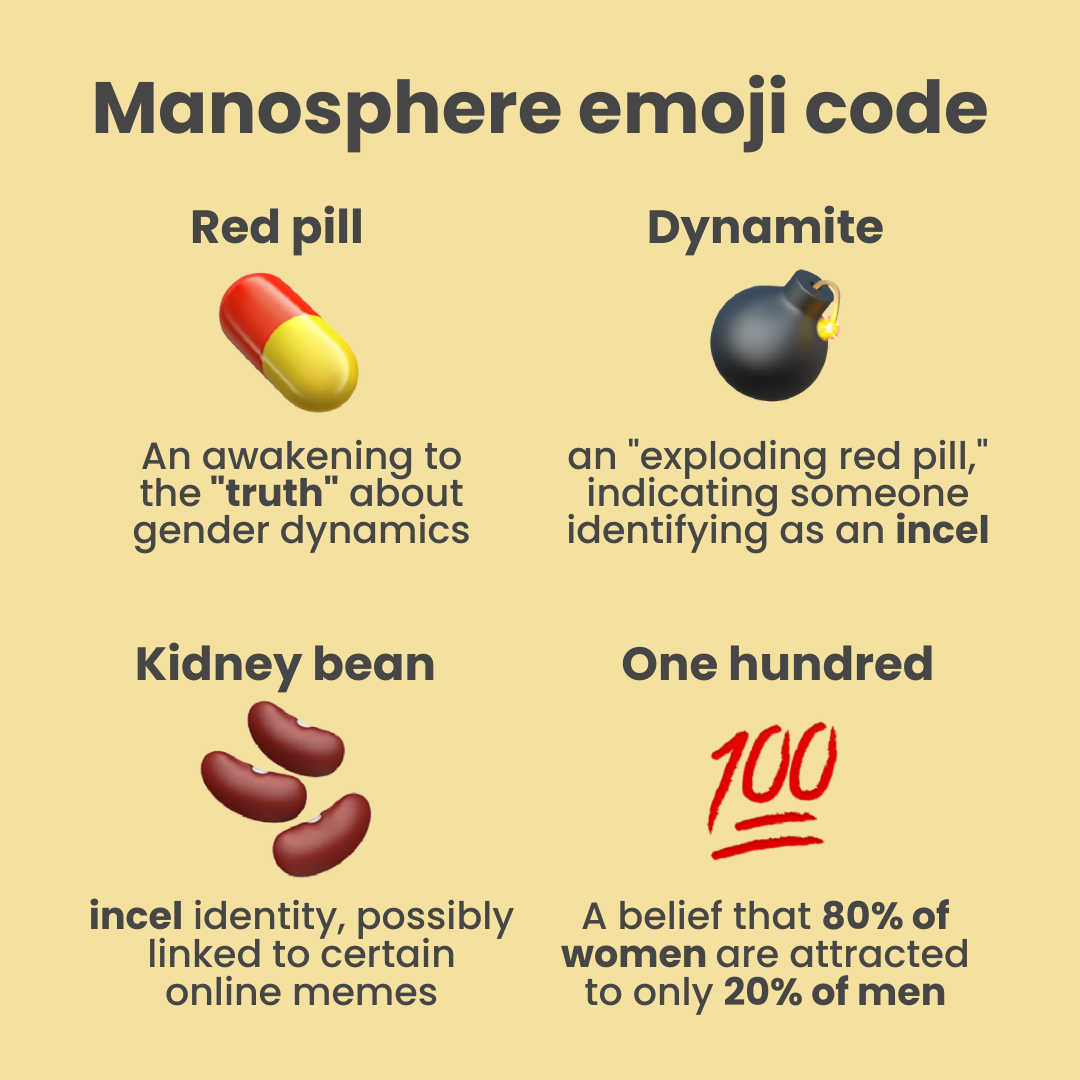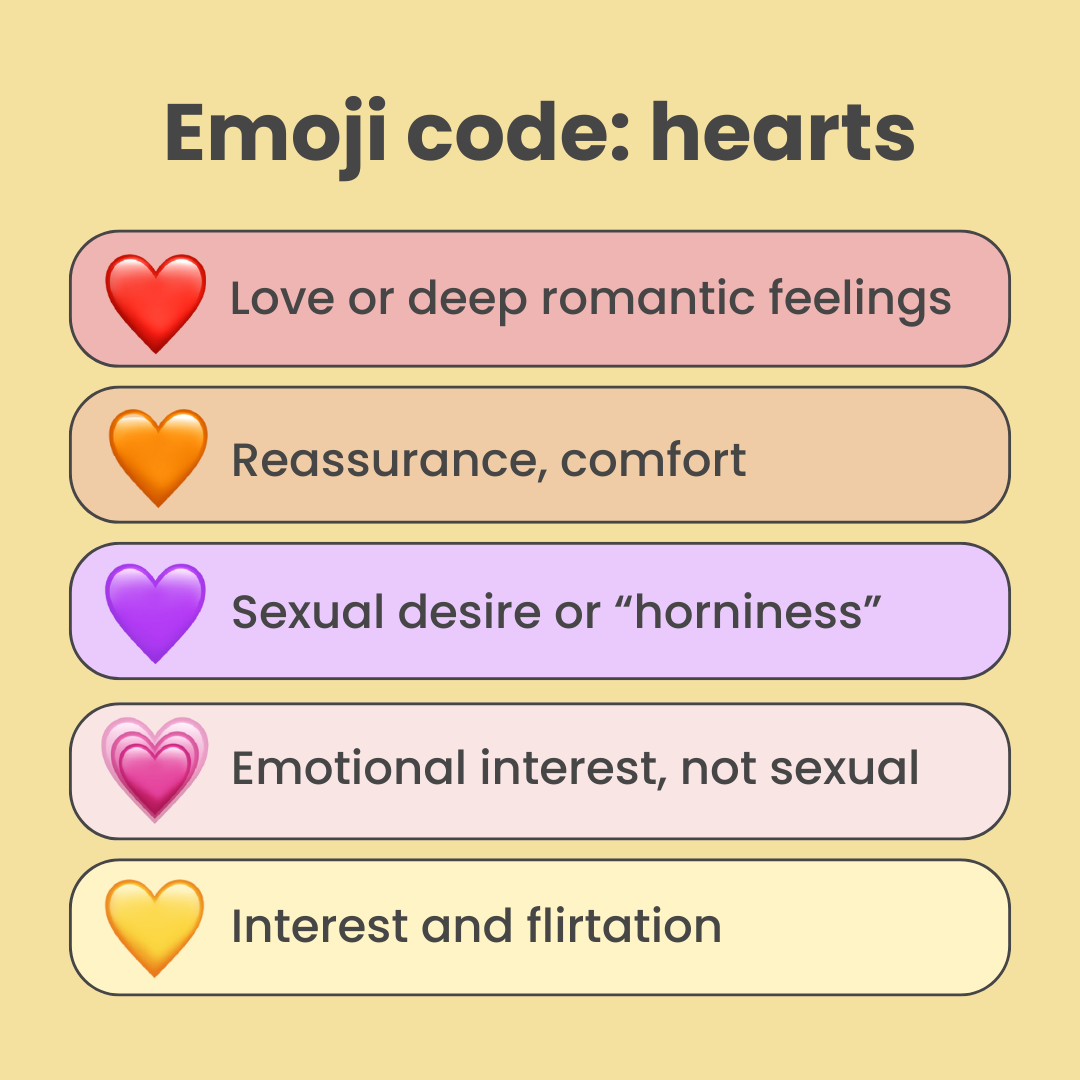What is the manosphere?
And how can you help your daughter navigate it?

Updated July 29, 2025
In this article
- Quick summary
- What is the manosphere?
- What is misogyny?
- Spotting the language of the manosphere
- The manosphere : what some symbols really mean online
- What if your daughter asks about the manosphere?
- What if your daughter’s dealing with misogyny online?
- What if your daughter’s dealing with misogyny in person?
- We know this is a really difficult topic to handle
Quick summary
- The manosphere is a growing network of online spaces where some boys and men share sexist, angry views about women – and its influence is showing up in teen culture
- Misogynistic content often appears in subtle ways – through slang, memes, or even emojis, making it harder for parents and teachers to spot
- You don’t need to have all the answers, but try to stay curious, keep talking, and remind your daughter she can always come to you with anything

At luna, our mission is to support teen girls through adolescence, and the people raising them – through every awkward, memorable, incredible and sometimes confusing part of growing up.
And right now, there’s something happening online that we think more parents need to know about.
It’s called the manosphere.
The manosphere is a growing network of online spaces where boys and men share views that are often angry, sexist, and damaging.
While your daughter might not be the one watching this content, chances are, she’s still affected by it.
Maybe it’s the boy in her class repeating something he saw on TikTok.
Maybe it’s a friend joking about “alpha males” or “red pills.”
Maybe she’s already come to you asking, “what is the manosphere?”
Add to that a constant stream of content from social media algorithms – and the conversation sparked by the Netflix show Adolescence – and it’s easy to feel unsure of what to say, or how to help.
That’s where we come in.
In this guide, we’ll walk you through what the manosphere actually is, how to spot its language and symbols, and what to do if your daughter is seeing or experiencing misogyny – online or off.
We’re not here to panic you or lecture you, just offer real, honest info to help you feel more confident navigating it all with her.
So let’s get into it.
What is the manosphere?
The manosphere is a group of online spaces where some men and boys share ideas that are often angry, sexist, or anti-women.
They might blame women for their problems, spread harmful views about gender roles, or talk about dating in really negative and unfair ways.
A lot of this content is dressed up as advice – how to be more confident or “manly” – but it can lead people down a path of thinking that women are the enemy.
And even if your daughter isn’t the one watching it or is against it, she might still be affected by the things boys around her are seeing and saying.
Recently, in the luna app, we received this question from a teen girl:
“Some of my friends support Andrew Tate, and that makes me uncomfortable because of all the sexist things he has said. Me and some of my friends have tried to talk to them about it, but they get annoyed with us for 'always bringing it up'. I'm not sure if i should unfriend them or not, but i am worried that i will lose the rest of my friendgroup if i do.”
Even though they’re not directly engaging with this content, it’s clear it’s reaching them in the playground.
What is misogyny?
You may already know this, but we just wanted to address it just in case.
Misogyny means dislike or unfair treatment of women and girls.
Sometimes it’s obvious – like name-calling, rude jokes, or harassment.
Other times, it’s more hidden, less obvious – like believing that girls should behave a certain way, or that they’re less capable than boys.
Misogyny shows up a lot online, especially in videos and memes that mock or put down women.
It’s one of the key ideas pushed in manosphere content, even if they don’t explicitly call it by its name.
Spotting the language of the manosphere
The manosphere has its own kind of slang – and some of it’s easy to miss.
You might overhear this kind of language if you’re sat together and your daughter’s watching TikTok.
She may also ask you what it means, having overheard it in school.
Here are some definitions of manosphere terminology:
- “Red-pilled”: someone who believes they’ve “seen the truth” about women and feminism
- “Simp”: an insult aimed at boys who are kind or respectful towards girls
- “Alpha”: used to describe a so-called strong, dominant man
- “Beta”: used to insult men who are seen as weak, emotional, or not dominant – basically, the opposite of “alpha”
- “High-value woman”: a term used to describe women who are seen as “worthy” of male attention – usually based on looks, youth, or how “submissive” they are
- “Chad”: a nickname for a stereotypically good-looking, popular, “alpha” man – often used in a jealous or mocking way, especially by incel communities
“Incel”: short for “involuntary celibate” – this term is used by some men who feel rejected by women and often blame women for their lack of relationships; some parts of the incel community promote really harmful and extreme views - “The 80/20 rule”: a belief that 80% of women are only interested in the top 20% of men – it’s often used to justify bitterness or entitlement, especially in dating conversations
This kind of language often turns up in jokes or trending content, which makes it harder to spot as harmful.
In fact, only recently we discussed slang terms with teen girls who use the luna app, and they mentioned “alpha” was a term they use regularly to describe someone they fancy.

The manosphere emoji code: what some symbols really mean online
Some of this manosphere messaging is even hidden in emojis – which might look innocent but can have a completely different meaning in certain online groups.

Here’s what to watch for:
- Red pill emoji (💊): symbolises an awakening to the "truth" about gender dynamics, commonly referenced in the manosphere
- Dynamite emoji (💣): represents an "exploding red pill," indicating someone identifying as an incel
- 100 emoji (💯): associated with the "80/20 rule," a belief that 80% of women are attracted to only 20% of men, suggesting a skewed perception of attraction
- Kidney bean emoji (🫘): used to signify incel identity, possibly linked to certain online memes
- Red heart emoji (❤️): love or deep romantic feelings
- Purple heart emoji (💜): sexual desire or “horny” intentions
- Yellow heart emoji (💛): interest and flirtation (asking “are you interested?”)
- Pink heart emoji (💗): emotional interest without sexual intent
- Orange heart emoji (🧡): reassurance, comfort, or “you’re going to be fine”
💡 Helpful to know: your teen might not be using these emojis this way – but knowing the meanings can give you more context if something feels off

What if your daughter asks about the manosphere?
If your daughter brings it up, that’s a good sign. It means she trusts you and wants to understand more.
Here’s how to respond:
- Keep it calm and open: let her speak, and avoid reacting strongly while she talks
- Be honest: you could say, “some small online groups share really unkind, untrue views about women, and they call it the manosphere”
- Ask questions: find out what she’s seen or experienced, and how that makes her feel – it doesn’t have to be a lecture, just try to get an idea of how this has affected her
- Offer support: once you know more, let her know she can always come to you, no matter what she sees or hears online
What if your daughter’s dealing with misogyny online?
Sadly, lots of girls come across sexist comments or content online – especially on social media or gaming platforms.
If that happens:
- Let her talk: just listening can help more than you think
- Back her up: tell her you believe her, that it’s not her fault, and it isn’t okay
- Help her take action: show her how to block or report the person
- Talk about how to handle it: like not replying to trolls, and looking after her own headspace by taking time away from the platform
- Check in later: if it really upset her, speak to a school counsellor or if it’s really impacting her day to day life a doctor
What if your daughter’s dealing with misogyny in person?
Misogyny isn’t just online.
If she’s hearing rude or sexist things in school, clubs, or anywhere else:
- Ask what happened: give her space to share her story
- Help her plan a response: she doesn’t have to accept it, help her to plan what she’ll say next time if safe to do so – and remind her that she also doesn’t have to deal with it alone
- Get others involved: talk to teachers or safeguarding staff if needed
- Keep a record: if it happens more than once, it’s good to have details written down
- Remind her she’s not alone and her concerns are valid: knowing you’ve got her back can make a big difference
We know this is a really difficult topic to handle
Honestly, there isn’t a perfect way to navigate these things, and the manosphere isn’t always easy to spot – that’s often the point.
But the more we understand how it works, the better we can help the girls in our lives feel safe, supported, and confident in their own skin.
If you ever need a positive space to recommend to your daughter, luna is an app that’s dedicated to helping teen girls feel more confident and empowered.

Know that, at the end of the day, you don’t need to know every slang word or decode every emoji. You just need to stay curious, keep talking, and let her know you’re always there.
How we created this article:
luna's team of experts comprises GPs, Dermatologists, Safeguarding Leads and Junior Doctors as well as Medical Students with specialised interests in paediatric care, mental health and gynaecology. All articles are created by experts, and reviewed by a member of luna's senior review team.
Sources:
Internet Matters "What is the manosphere and why is it a concern?" | Accessed 26.03.25
https://www.internetmatters.org/hub/news-blogs/what-is-the-manosphere-and-why-is-it-a-concern/Internet Matters "Online misogyny and young people" | Accessed 26.03.25
https://www.internetmatters.org/wp-content/uploads/2023/11/Internet-Matters-Online-misogyny-and-young-people-teacher-briefing-Nov-2023.pdfHarriet Over, Carl Bunce, Delali Konu, David Zendle "What do we need to know about the manosphere and young people’s mental health?" | Accessed 26.03.25
https://acamh.onlinelibrary.wiley.com/doi/10.1111/camh.12747PSHE Association "Addressing the influence of online misogyny and the manosphere through RSHE/PSHE" | Accessed 26.03.25
https://pshe-association.org.uk/news/addressing-the-influence-of-online-misogyny-and-the-online-manosphere-through-rshe/psheUCL "Social media algorithms amplify misogynistic content to teens" | Accessed 26.03.25
https://www.ucl.ac.uk/news/2024/feb/social-media-algorithms-amplify-misogynistic-content-teensSSS Learning "Manosphere emojis" | Accessed 26.03.25
https://ssslearning.co.uk/safeguarding-articles/manosphere-emojisWe'd love to keep in touch!
Sign up to our parent newsletter for emails on the latest teen trends, insights into our luna community and to keep up to date
By signing up, you are agreeing that we can use your email address to market to you. You can unsubscribe from marketing emails at any time by using the link in our emails. For more information, please review our privacy statement.